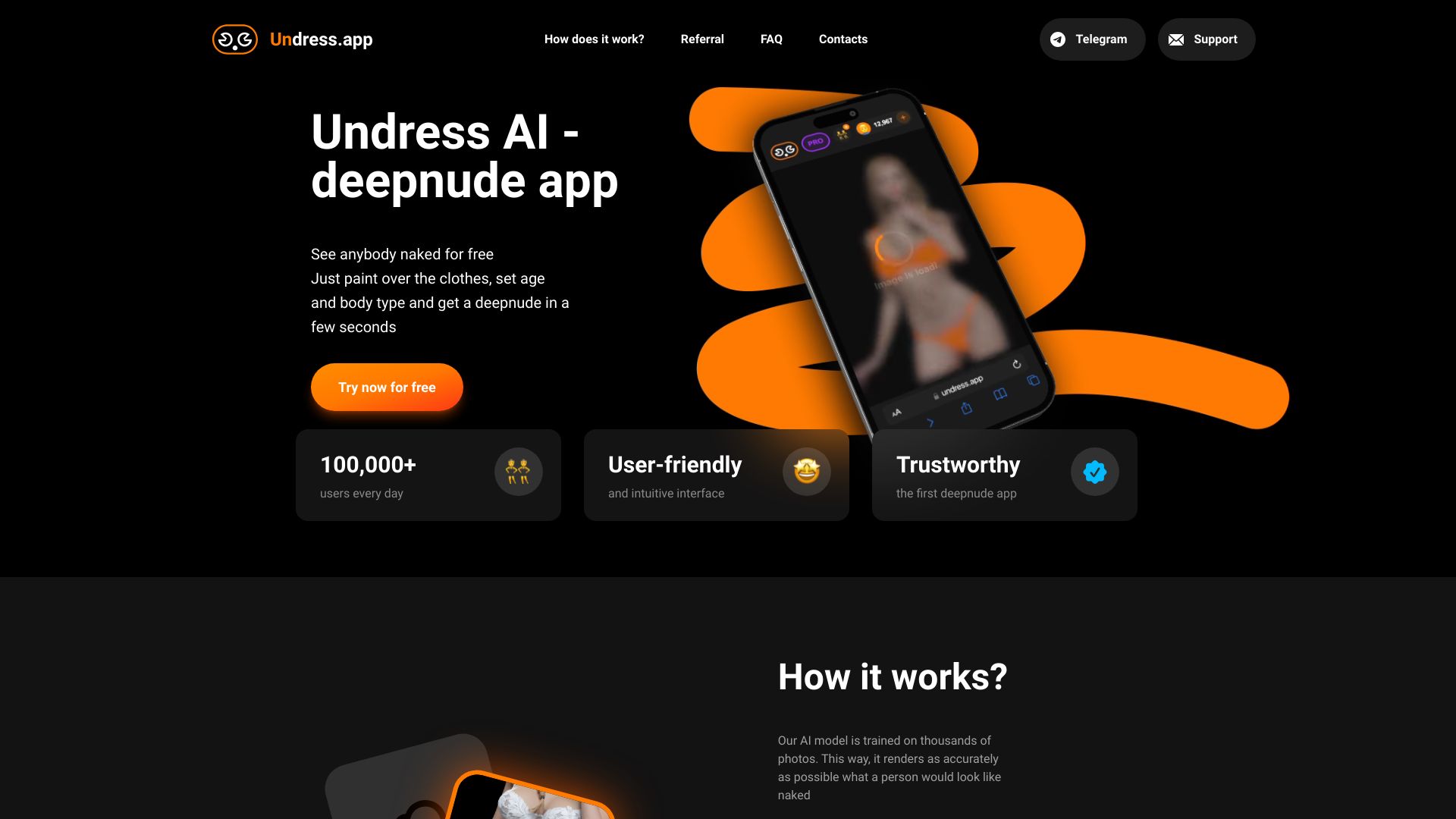Hey there friend! let's dive straight into something that's been buzzing around the internet lately. Free app to undress is a term that's been making waves, and for good reason. It's not just about curiosity or a tech gimmick; it's a topic that touches on privacy, ethics, and even personal safety. So, what exactly are these apps, and why should you care? Stick around, because this conversation is about to get real interesting.
If you've been online lately, you might have stumbled upon some discussions or headlines about apps that claim to "undress" people using AI technology. Sounds like something out of a sci-fi movie, right? But here's the catch—these aren't just fictional concepts. Some of these apps are real, and they're raising serious concerns about how far technology should go when it comes to personal privacy.
Now, before we go any further, let's set the record straight. While the idea of an app that can "undress" someone might sound intriguing or even entertaining to some, the implications are far from harmless. In this article, we'll break it down for you—what these apps are, how they work, and most importantly, why you should be cautious. So grab your favorite drink, and let's dig in!
- Mia Threapleton The Rising Star In The Spotlight
- Jennifer Grant The Remarkable Journey Of A Woman Who Inspires
What Exactly Are These Free Apps to Undress?
Alright, let's start with the basics. When we talk about "free app to undress," we're referring to software or applications that use artificial intelligence to digitally alter images. These apps claim to remove clothing from photos, creating a simulation of nudity. Sounds wild, doesn't it? But here's the thing—this isn't just about tech innovation. It's about ethics, consent, and the potential misuse of technology.
These apps often leverage advanced machine learning algorithms to analyze images and generate new ones. While the technology itself is impressive, the way it's being used raises some serious red flags. Imagine someone taking a picture of you from social media and using one of these apps to create a fake image without your permission. Creepy, right? And that's exactly why this topic matters so much.
How Do These Apps Work?
Let's break it down step by step. These apps typically work by analyzing the structure of the original image and using AI to predict what the person might look like without clothing. The process involves complex algorithms that study patterns, shapes, and textures to create a convincing simulation. But here's the kicker—these apps don't actually "see" the person naked. Instead, they generate content based on pre-existing data and patterns.
- Hdhub4u Movies Your Ultimate Destination For Blockbuster Entertainment
- Ullu New Web Series Download Your Ultimate Guide To Streaming And Downloading
Some of the more advanced apps even claim to offer features like adjusting skin tones, adding realistic details, and ensuring the altered image looks as natural as possible. But don't be fooled—this level of realism doesn't make it any less invasive or unethical. In fact, it makes the issue even more concerning because the results can be so convincing that people might mistake them for real.
Why Are These Apps Controversial?
Now, let's talk about the elephant in the room. Why are these "free app to undress" tools such a big deal? The answer lies in the potential for abuse. Imagine if someone used one of these apps to create fake nude images of you and shared them online without your consent. That's not just a violation of your privacy—it's a violation of your dignity and trust.
These apps are often used in the context of revenge porn or cyberbullying. They can be weaponized against individuals, especially women, to humiliate, harass, or blackmail them. And here's the kicker—because the images are digitally altered, they might not even fall under traditional legal definitions of explicit content. This creates a legal gray area that makes it harder to hold perpetrators accountable.
Who Is Most Affected?
While anyone can be a target, women and marginalized communities are disproportionately affected by these apps. The culture of objectification and the normalization of invasive technology only exacerbate the problem. It's not just about the technology itself—it's about how it's being used and who's bearing the brunt of its consequences.
Think about it—these apps don't just harm individuals; they harm society as a whole. They perpetuate harmful stereotypes, normalize non-consensual behavior, and create an environment where people feel unsafe sharing their photos online. And let's face it—in today's digital age, it's almost impossible to avoid sharing some form of personal content online.
Are These Apps Legal?
Here's where things get tricky. The legality of these apps varies depending on where you live and how they're being used. In some jurisdictions, creating or sharing digitally altered images without consent may be considered illegal. However, the laws surrounding digital privacy and consent are still evolving, which leaves a lot of room for interpretation.
For example, in the United States, the First Amendment protects freedom of speech, but it doesn't necessarily protect non-consensual image manipulation. Some states have passed specific laws to address revenge porn and deepfake content, but these laws are still relatively new and not universally applied.
What About Ethical Concerns?
Even if these apps aren't technically illegal, that doesn't mean they're ethical. Ethical considerations go beyond what's legal—they involve respecting people's boundaries, obtaining consent, and using technology responsibly. When you use an app to "undress" someone without their permission, you're crossing a major ethical line.
Think about it this way—if someone took a photo of you and used it in a way you didn't agree with, how would you feel? It's important to consider the impact of our actions, even if we're just curious or experimenting with new technology. At the end of the day, consent should always be the top priority.
How to Protect Yourself
Now that we've covered the risks, let's talk about what you can do to protect yourself. If you're worried about someone using one of these apps to create fake images of you, there are steps you can take to minimize the risk. Here are a few tips to keep in mind:
- Be mindful of what you share online. Avoid posting photos that could be easily manipulated or used against you.
- Use privacy settings on social media to control who can see your photos and personal information.
- Regularly monitor your online presence and report any suspicious activity to the platform administrators.
- Consider using tools like Google Reverse Image Search to check if your photos have been shared elsewhere without your knowledge.
- Stay informed about the latest developments in digital privacy and consent laws in your area.
Remember, prevention is key. The more proactive you are about protecting your personal information, the less likely you are to become a victim of digital manipulation.
What to Do If You're Affected
If you find yourself in a situation where someone has used one of these apps to create fake images of you, don't panic. Here's what you can do:
- Contact the platform where the image was shared and request its removal. Most reputable platforms have policies in place to handle non-consensual content.
- Document everything—take screenshots, save evidence, and keep a record of all communications related to the incident.
- Reach out to legal professionals or organizations that specialize in digital privacy and consent issues for guidance.
- Consider reporting the incident to law enforcement if you believe it constitutes a criminal offense.
You're not alone in this fight. There are resources and support systems available to help you navigate the aftermath of a digital privacy breach.
Alternatives to Free App to Undress
If you're curious about image manipulation or AI technology, there are plenty of ethical alternatives to explore. Here are a few ideas:
- Experiment with photo editing apps that focus on creative expression rather than invasive manipulation.
- Learn about AI art generation tools that allow you to create stunning visuals without compromising anyone's privacy.
- Explore educational resources on digital ethics and responsible technology use.
The world of technology is vast and full of possibilities. There's no need to resort to harmful practices when there are so many positive ways to engage with digital tools.
Why Ethical Tech Matters
At the end of the day, it's not just about what we can do with technology—it's about what we should do. Ethical tech prioritizes user safety, consent, and respect for personal boundaries. When we use technology responsibly, we create a safer and more inclusive digital environment for everyone.
So the next time you're tempted to try out one of these "free app to undress" tools, take a moment to think about the potential consequences. Is it really worth risking someone else's privacy and dignity just for a fleeting moment of curiosity? I think we both know the answer to that.
Final Thoughts
Alright, we've covered a lot of ground here. Let's recap the key points:
- "Free app to undress" tools use AI to digitally alter images, often without consent.
- These apps raise serious concerns about privacy, ethics, and potential misuse.
- While the legality of these apps varies, their ethical implications are undeniable.
- Protecting yourself involves being mindful of what you share online and taking proactive steps to monitor your digital presence.
- There are plenty of ethical alternatives to explore if you're interested in AI and image manipulation.
Now, it's your turn to take action. Share this article with your friends and family to raise awareness about the risks associated with these apps. Let's work together to create a digital world that values consent, respect, and personal privacy.
And hey, if you have any questions or thoughts about this topic, drop a comment below. I'd love to hear your perspective. Until next time, stay safe and stay curious!
Table of Contents


